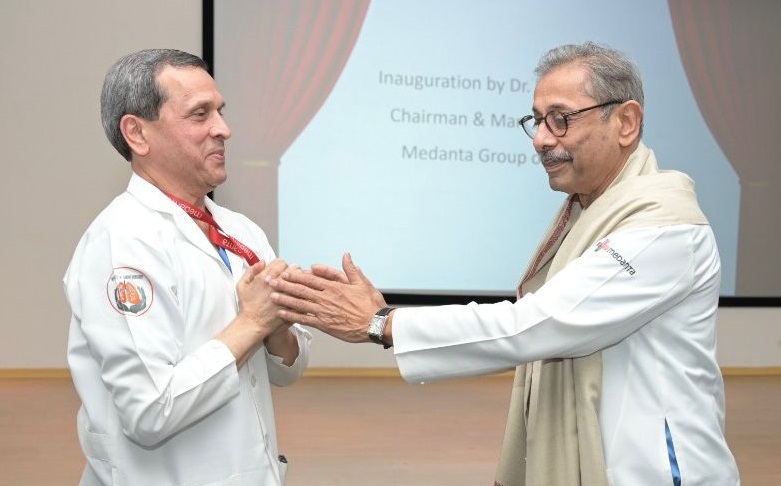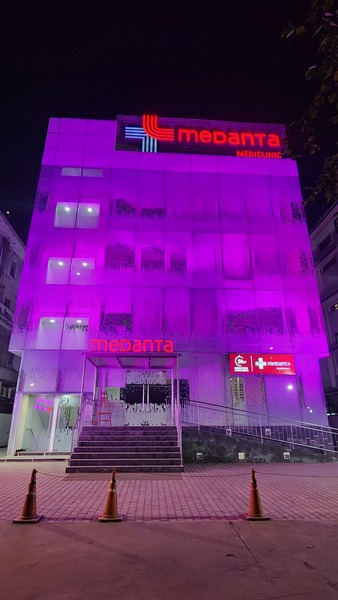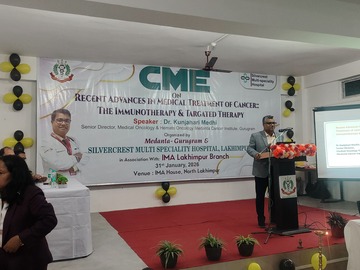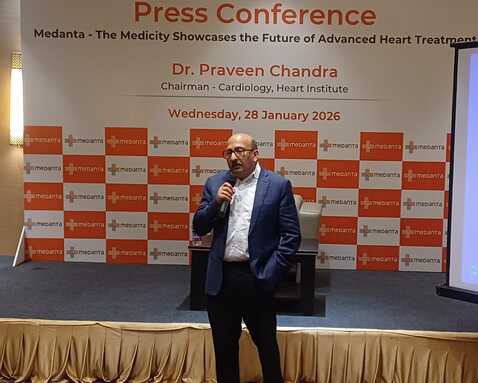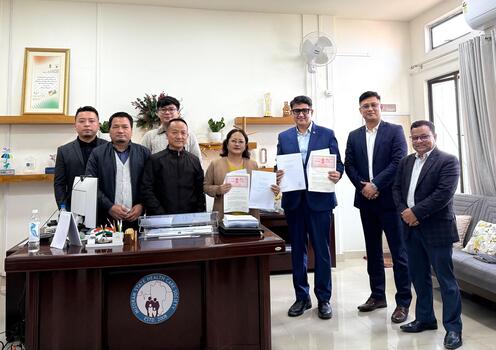
Medanta Surgeons Remove Rare Tumour, Rebuild Face of Iraqi Toddler in 14-Hour Surgery
Gurugram, April 11: A 2-year-old boy from Iraq, suffering from a rare low-grade sarcoma known as Myofibroblastoma, has been successfully treated at Medanta, the country’s leading multi-speciality hospital ranked as the best private hospital in India by Newsweek, for six consecutive years. The child arrived in a critically weak and severely malnourished state, experiencing intense pain and minimal oral intake—limited to milk and liquids administered via syringe. A massive 10cm × 6cm tumour engulfed his cheek, mouth and throat, making it impossible for him to open or close his mouth. Despite undergoing chemotherapy in his home country, the tumour continued to grow, and his family was turned down by over 40 doctors before finding hope at Medanta. A tumour board was constituted of experts from across disciplines, including Dr. Deepak Sarin (Vice Chairman, Head & Neck Oncology), Dr. S.P. Yadav (Director, Paediatric Oncology), Dr. Shandip Sinha (Director, Paediatric Surgery), Dr. Rajiv Uttam (Director, Paediatric Critical Care), Dr. Rakesh Kumar Khazanchi (Chairman, Plastic, Aesthetic and Reconstructive Surgery) and Dr. Neeru Bansal (Senior Consultant, Paediatric Anaesthesia), to create a treatment and facial reconstruction plan that would restore the child’s ability to eat and speak, giving a chance of survival.
The child arrived at Medanta critically ill—malnourished, in constant pain, unable to walk or eat, and with a large facial swelling. CT scans showed the tumor extending toward the skull base but without deep attachment to the throat or mouth, making surgery a viable option. A detailed examination under anesthesia confirmed the tumor was resectable. However, given the tumor’s size and the child's frail health, the team first decided to shrink the tumor and improve his nutrition. When the child’s symptoms persisted, surgery remained the only curative path. The plastics team assessed the feasibility of reconstruction, and recognizing the urgency, doctors swiftly planned the procedure and secured PICU support.
Dr. Deepak Sarin, Vice Chairman, Head and Neck Cancer, Cancer Care, Medanta, Gurugram, said, “This was an exceptionally complex case that required complete tumour removal and intricate facial reconstruction. With a low-grade sarcoma like Myofibroblastoma, full resection is vital for long-term survival. The tumour’s proximity to the skull base and involvement of key facial structures made restoring both form and function critical. The 14-hour surgery involved removing the tumour along with the inner cheek, part of the upper jaw, the entire left lower jaw, and jaw muscles—leaving a major facial defect. We used a microvascular flap, transplanting tissue and tiny blood vessels (1mm in diameter) from another part of the body and connecting them to facial vessels, to reconstruct the same. While routine in adults, this technique is far more demanding in children due to fragile vessels and heightened infection risk from malnutrition. Given the child’s frailty, we also performed a feeding gastrostomy to support post-operative nutrition. The team reconstructed 60–70% of the jaw, greatly improving the child’s ability to eat, speak, and regain facial structure. Thanks to the combined efforts of pediatric surgery, plastic surgery, and head and neck oncology, the child is now fully recovered with a vastly improved quality of life.”
However, the surgery alone wouldn’t have been possible without the use of a novel medicine that played a key role in shrinking the tumour before the operation.
Dr. S.P. Yadav (Director, Paediatric Oncology) said, “When the child arrived, he was in critical condition, unable to eat as the large mass had displaced his tongue. His cancer had relapsed after 3–4 failed chemotherapy cycles, leaving surgery as the only viable option. However, due to the tumor’s size and aggressive nature, immediate intervention was too risky. We opted for a non-chemotherapy approach using sirolimus, an anti-angiogenic medicine that cuts off blood supply to tumors. The response was remarkable—within weeks, it had shrunk by nearly 70%, making surgery possible. As the swelling subsided, his tongue returned to position, allowing him to eat again. A small portion of the tumor remained on the left side of the mouth.”
In such case, Ppost-operative care remains critical, especially given the child’s malnourished state. A multidisciplinary team led by Dr. Shandip Sinha and Dr. Rajiv Uttam ensured meticulous nutrition, infection control, and respiratory support, enabling a smooth recovery. Two weeks post-surgery, the child began eating soft foods and is now progressing well under regular follow-ups, guided by Medanta’s Tumour Board approach – a multidisciplinary panel at Medanta that reviews complex cancer cases and creates personalized, evidence-based treatment plans for better outcomes.
This case showcased seamless collaboration across oncology, surgery, anaesthesia, and critical care, ensuring comprehensive treatment from diagnosis to recovery. It reflects Medanta’s patient-centric approach and leadership in advancing paediatric oncology care.
